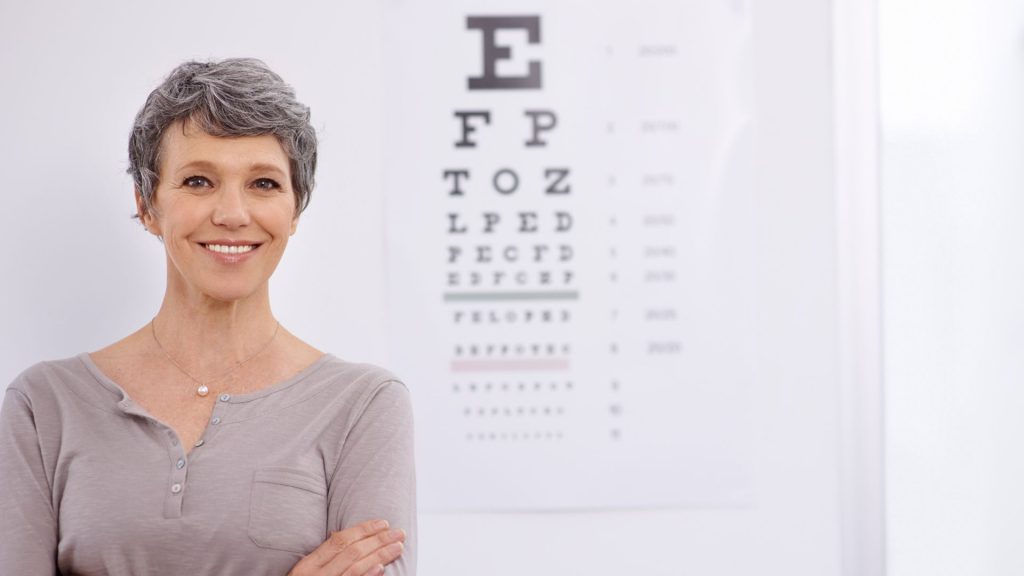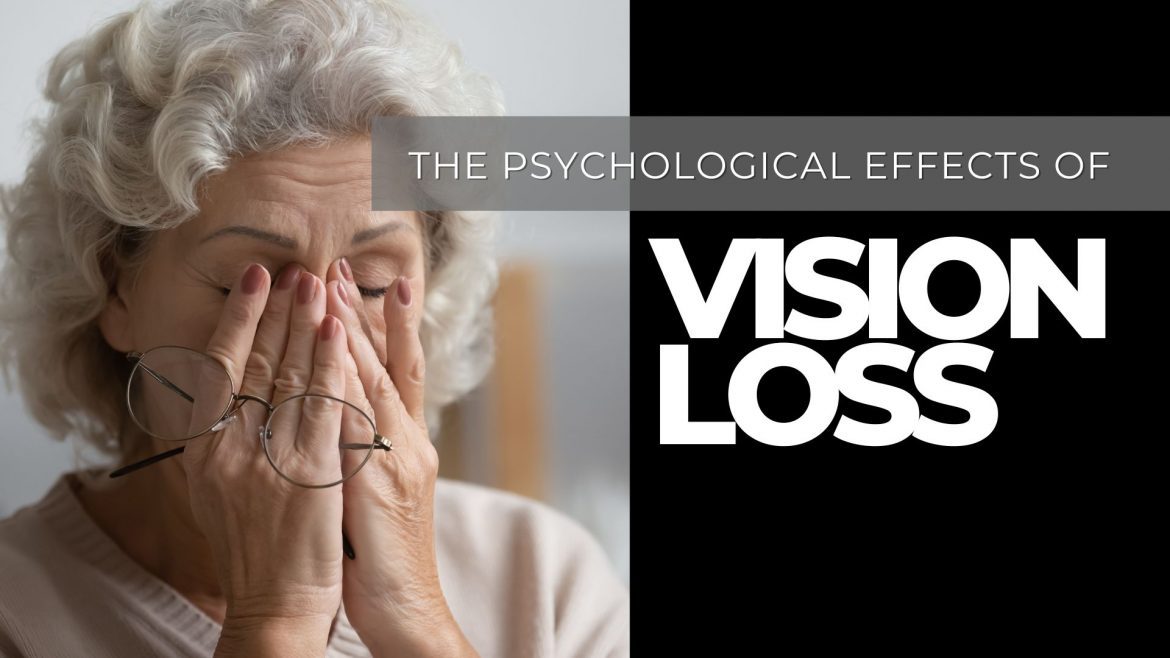![]()
More than 7 million Americans currently live with some form of vision loss. Another 94 million adults are at risk for serious vision loss, according to the CDC. Expanded globally, the number of people considered to be visually impaired is estimated to be over 2.2 billion.
Considering that people are living longer, experts expect these numbers to increase in the coming years.
While vision loss and vision issues are expected to some degree, especially with age, it doesn’t mean everyone is willing—or able—to accept a change to how they see the world.
For most people, gradual changes in vision can be addressed with prescription eyeglasses or contact lenses.
On the other hand, vision changes—especially when they happen rapidly and are not able to be corrected with glasses or contacts—are often difficult to accept, and, for many, it takes a significant toll on their emotional and mental health.
Understanding the difference between common vision disorders and diseases
Most vision issues, especially in the United States, are caused by eye disorders, more commonly known as refractive errors. According to the National Eye Institute, refractive errors are a result of a change in the structure of the eye that prevents light from focusing correctly on the retina (the part of the eye that senses light and sends signals to the brain, allowing you to see).
The most common types of refractive errors include:
- Near-sightedness (myopia)
- Farsightedness (hyperopia)
- Astigmatism (an imperfect curve in the cornea or lens that distorts vision)
- Age-related changes occurring between ages 40 – 50 that make it difficult to focus up close (presbyopia)
Most, if not all of these types of refractive errors, can be corrected by prescription eyeglasses, contact lenses, or surgical procedures.
On the other hand, there are a number of eye diseases, most of them age-related, that are the primary cause of blindness and low vision. The most common of these eye diseases include macular degeneration, cataracts, diabetic retinopathy, and glaucoma.
While some of these eye diseases, like cataracts, can be managed and treated, the majority of them are not treatable and must be carefully managed in order to slow the progression of vision loss.
The connection between vision loss and mental health
Obviously, any significant change in vision can have a profound effect on your physical health and how you navigate the physical environment around you. Additionally, changes in vision can also have serious implications for emotional and mental health—a fact not too many people recognize or talk about.
Recent studies confirm the significant impact vision impairment has on emotional and mental health. Additionally, those suffering from vision loss or vision impairment have also been shown to experience elevated rates of anxiety, depression, and other related mental health issues.
Of the five human senses, arguably none is more important than vision, especially when that ability starts to decline. Imagine how difficult everyday tasks would be if your vision was reduced by a quarter, or a half, or worse yet, disappeared altogether.
Vision loss, depression, and anxiety
Nearly one-third of individuals with visual impairments and disabling eye diseases experience mild depressive symptoms. These mild symptoms of depression include:
- Changes in appetite and weight (including weight loss and weight gain)
- Feelings of worthlessness
- Sense of hopelessness
- Exhaustion/fatigue
- Lack of energy/loss of motivation
- Disruption to sleep
- Trouble focusing or concentration
- Sadness
Similarly, nearly the same percentage of individuals experiencing visual impairments or loss of vision also report experiencing serious anxiety. Interestingly, younger adults report experiencing anxiety at five times the rate of adults over the age of 65.
Symptoms of serious anxiety include:
- Feeling of restlessness
- Irritability
- Nervousness
- Elevated heart rate
- Rapid breathing
- Sweating
Additionally, undiagnosed or untreated anxiety has been linked to the increased risk of developing depression. Considering this, anyone experiencing vision loss should talk to their doctor about being screened for both depression and anxiety.
Steps for accepting and coping with vision loss
Obviously, any change in vision will have a profound effect on how you or a loved one will navigate their physical environment. In addition to the physical implications of these conditions, as discussed above, vision loss and blindness also have a serious impact on mental and emotional health.
With proper support and guidance, those experiencing vision loss can take several steps to better understand and adapt. These steps include:
Take time to fully understand the condition
Review the condition with your doctor, seek alternative options, and request more information. In many cases, there are state agencies and nonprofit groups that specialize in the condition causing vision loss who are happy to serve as a resource for you and your family.
In addition, many find it helpful to reach out to others afflicted with the same condition, either as support or as a way to find additional resources and information. Social media sites are a common meeting point to locate and communicate with groups who can support you and your family.
Allow yourself time to grieve and accept
As mentioned above, losing your eyesight can be a traumatic experience. It’s common for people progressing through vision loss to experience stages of grief similar to those experienced after experiencing a profound loss (including the death of a loved one).
These stages of grief include periods of denial, depression, anger, bargaining, and finally acceptance. While progressing through these stages of grief can be a painful, frustrating experience, some find it helpful to know that it is a completely natural and healthy process.
Spend time with a professional counselor
As with any other major life event, losing your vision can be a traumatic, life-altering experienc—and one that you should not try to navigate on your own. Not only can vision loss bring on bouts of anxiety and depression, it also comes with feelings of frustration, anger, confusion, and isolation.
While these feelings are to be expected, they can be overwhelming. Additionally, it’s common for these feelings to become more intense over time. As vision loss progresses, it becomes all the more important to seek the support and guidance of a professional therapist for support during this transition.
Make eye health a top priority

While it seems that most eye disorders and eye diseases are age-related, there’s really nothing we can do to turn back the hands of time. However, there are several important steps that you can implement as a way to protect your vision, including:
- Maintain a regular eye care schedule.
This includes making regular appointments for eye exams with your eye care provider. Since most eye changes and eye diseases start after age 40, the American Academy of Ophthalmology recommends scheduling a complete eye exam when you turn 40. Your eye doctor will review these results and, based on the findings, recommend how often you should return for future eye exams.
- Research and understand your risk for eye disease.
Like several serious health issues, many eye diseases and conditions are hereditary, meaning they are determined by several genetic factors and are able to be passed down from your parents. Surprisingly, and According to Research to Prevent Blindness, there are over 350 eye diseases that are known to be hereditary. These include serious eye diseases, including age-related macular degeneration, cataracts, and glaucoma.
- Protect your eyes.
Although protecting your eyes from environmental factors won’t necessarily reduce your risk of eye diseases, it will significantly reduce the risk of causing damage to your eyes that could result in temporary or permanent vision loss and/or blindness.
Make it a general practice to protect your eyes from the harmful effects of UV light by wearing high-quality sunglasses when outside—even on cloudy days. It’s also very important to protect your eyesight by wearing safety glasses or eye protection when working on projects or activities, both at home and while at work.
Experts also recommend protecting your vision by wearing contact lenses only as directed, minimizing exposure and eye strain caused by digital screens , and taking time to rest your eyes throughout the day.
Vision loss doesn’t mean you can’t live happily
Experiencing mild to moderate vision loss or dealing with the potential of progressing toward total blindness doesn’t mean your life is over. Fortunately, there are a number of tools, tips, and technological advances designed to specifically help you function independently.
While dealing with vision loss is a difficult and emotional process, it’s important to recognize there are a number of resources and an abundance of helpful information and support specifically designed to help you and your loved ones work through the transition.


